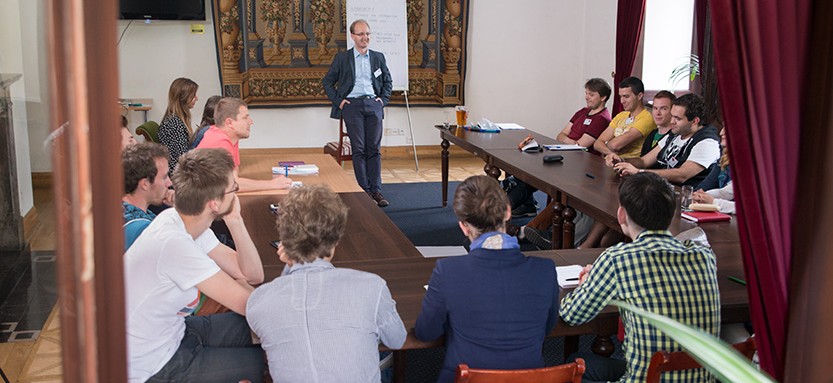
Have you ever thought about Central-Eastern Europe as a colony of the West? Do you consider homo sovieticus an endangered species? Tuesday’s report from Visegrad Summer School shows how our answers to these questions were.
“We share the European values with the lack of understanding, strongly idealizing Europe” – said Alexander Kiossev, professor in History of Modern Culture at the University of Sofia, introducing how can we draw a parallel through the concept of self-colonization between former colonies and the former states of the Eastern Bloc.
For the first consideration it might seem somewhat extreme, but according to Kiossev, postcolonial theory can help the better understanding of our countries close past and present. Kiossev says that the asymmetry of the world system is being reproduced by the internalization of the periphery status through the public discourse and through the unselected import and distribution of western ideas. One good example of this process is the high culture of the self-colonized nations which is “always imitative” and those who produce it are following western trends struggling for western recognition.
Kiossev also drew the basics of postcolonial theory by introducing the most important scholarly theories of, among others, Edward Said, Gayatri Spivak and Homi Bhabba. To clarify these theories he took the example of the modernization and Europeanization of Bulgaria.
Did the membership of the Eastern Bloc mean that the countries under soviet rule were colonized countries? – posted the question Kiossev in the end of his lecture. Although there was no consensus among the participants, one remark gained enough legitimacy to include it here: although our countries were definitely ruled by Soviet Russia, the imagination of the society already desired the West.
Meeting homo sovieticus
Who is homo sovieticus and what is its habitat? – This was the initial question of the panel debate led by Kai-Olaf Lang, research fellow at the German Institute for International and Security Affairs of the Stiftung Wissenschaft und Politik in Berlin. Undoubtedly, the debaters all had their own concept of homo sovieticus depending on their academic background but mainly national on where they came from.
Michal Łuczewski, a polish scholar specialized among others in historical sociology, sociotheology and social memory, interpreted Józef Tischner’s thoughts about the behavior of the post-soviet men, who often used this term explaining what has changed in Polish society after 1989 and what hasn’t. “Homo sovieticus needs somebody else to be a man, therefore his consciousness is determined by social being”- said Łuczewski. Continuing his argument he added: “if our - the homo sovieticus’ - dignity is given by somebody else, it means that we cannot be human and cannot take solidarity”. Łuczewski came to the point that “homo sovieticus is still there” in the post-soviet countries, but one thing changed: instead of communism we are dependent on capitalism.
Lower level of trust, confidence and solidarity – gave the translation for homo sovieticus Szabolcs Pogonyi, assistant professor in the Nationalism Studies Program at Central European University, Budapest. “It’s easy to blame homo sovieticus mentality, but it leads to a wrong direction” – he said – “because it suggests that the problems of post-socialist societies have nothing to do with the failure of democratic transition, the new institutional design and the political elites”.
“The expression homo sovieticus is being used in a normative way” – explained Juraj Buzalka, associate professor of social anthropology at the Faculty of Social and Economic Sciences at Comenius University, Bratislava. It describes a personality who does not take individual responsibility and stays inactive in the public sphere. Buzalka warned that one has to be careful with using cultural relativism to compare the ideal western citizenship to what we have in our post-communist societies. “Homo sovieticus is not the lack of civility but civility of a different kind” as the resistance to the system is immanently present in it.
Eszter Neuberger







































